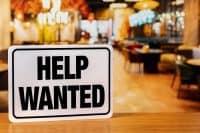
As inflation rose at a pace last posted over a decade ago, many U.S. workers got raises. The consumer price index was up over 8% for several months last year. The Social Security COLA, a good measure of raises across the economy, surged 8.7%. Some people got much less of an increase. This included people in economically troubled industries and many workers in low-paying retail jobs. Proving that supply and demand are still part of the economy, people in some sectors got double-digit raises. Pilots at Delta got a 34% raise. (Click here to see cities where wages will increase most by 2060.)
[in-text-ad]
As a reaction to the huge jump, Delta operations chief John Laughter said, “From the beginning of the negotiations process, we set out to deliver the industry’s best pilot contract to the industry’s best pilots, one that keeps us as a top destination for U.S. aviation careers, and this contract is a reflection of that unwavering commitment.” What he did not say is that there is a major shortage of pilots across the industry and that Delta could not afford a crippling strike, particularly in a period of high demand for air travel.
Delta pilots are not the only ones who will get huge wage increases. This will happen at every carrier because they all have the same problem.
The irony of the leverage that pilots have is that many were laid off during the most dangerous period during the pandemic. Carriers were grounded. These companies even needed government financial support. As the skies reopened, the airline found many pilots did not return. The problem had no solution beyond an offer most pilots could not refuse.
Few industries have the same profile as the airline industry does. Workers recently have been laid off across the tech, media and mortgage industries. A fall-off in revenue in these sectors has tightened profits or driven losses.
The airlines may be able to recruit more pilots. Many of these are retired military aviators. Yet, there will not be a surge of incoming pilots soon. The current pilots at Delta and other carriers have fantastic leverage.
100 Million Americans Are Missing This Crucial Retirement Tool
The thought of burdening your family with a financial disaster is most Americans’ nightmare. However, recent studies show that over 100 million Americans still don’t have proper life insurance in the event they pass away.
Life insurance can bring peace of mind – ensuring your loved ones are safeguarded against unforeseen expenses and debts. With premiums often lower than expected and a variety of plans tailored to different life stages and health conditions, securing a policy is more accessible than ever.
A quick, no-obligation quote can provide valuable insight into what’s available and what might best suit your family’s needs. Life insurance is a simple step you can take today to help secure peace of mind for your loved ones tomorrow.
Click here to learn how to get a quote in just a few minutes.
Thank you for reading! Have some feedback for us?
Contact the 24/7 Wall St. editorial team.



